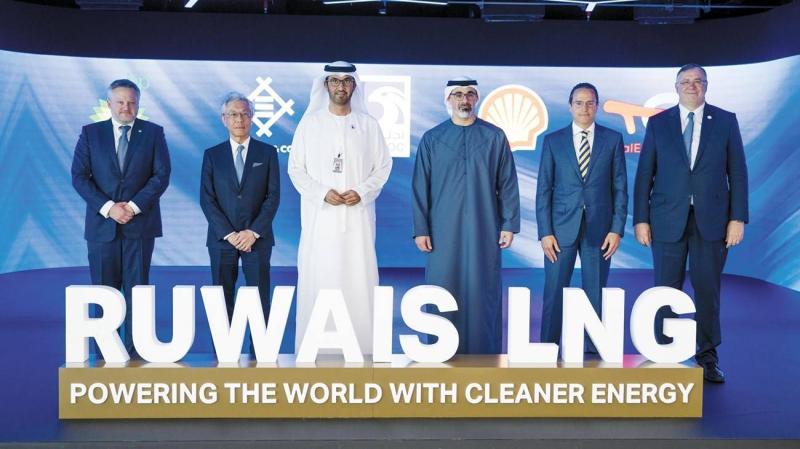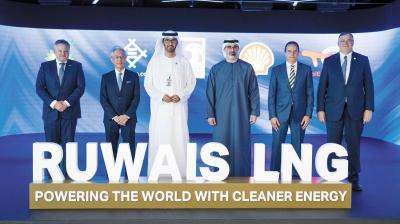Sheikh Khalid bin Mohamed bin Zayed Al Nahyan, Crown Prince of Abu Dhabi and Chairman of the Executive Council of the Emirate of Abu Dhabi, met with several heads and representatives of global energy companies to discuss the future of the energy sector and the efforts being made by the UAE to ensure a sustainable future for upcoming generations. The discussion also focused on adopting the latest innovations and technical solutions to enhance international cooperation in these vital areas. During the meeting, a signing ceremony took place for an agreement, which will see a number of global partners and investors join ADNOC's liquefied natural gas project in Ruwais.
The agreement was signed between ADNOC and companies BP, Mitsui & Co., Shell, and TotalEnergies, with each partner acquiring a 10% stake while ADNOC retains the majority share of 60%. These qualitative partnerships affirm Abu Dhabi's position as a reliable global destination for leading investments, based on the "Final Investment Decision" for the Ruwais LNG project, approved last month by His Highness Sheikh Khalid bin Mohamed bin Zayed Al Nahyan in his capacity as Chairman of the Executive Committee of ADNOC.
During the meeting and the strategic partnership signing ceremony, Sheikh Khalid bin Mohamed bin Zayed Al Nahyan affirmed that Abu Dhabi continues to establish itself as a leading and reliable destination for strategic partnerships and global investments in the energy sector, in line with the UAE leadership's commitment to employing innovative technical solutions and driving sustainable economic development at the national level.
He noted that the UAE continues to achieve more milestones in addressing the challenges facing the energy sector by investing in clean energy projects and low-carbon initiatives, while strengthening strategic cooperation with energy partners from around the world to support initiatives that contribute to sustainable development in vital sectors and industries.
He emphasized the UAE leadership's interest in developing the skills and competencies of national cadres by supporting investments in research and development, artificial intelligence, and enhancing strategic partnerships for knowledge exchange, creating new avenues for innovation in the transition to clean energy.
The agreement was signed by His Excellency Dr. Sultan Ahmed Al Jaber, Managing Director and CEO of ADNOC and its group of companies, along with Murray Auchincloss, CEO of BP, Kenichi Hori, President and CEO of Mitsui & Co., Wael Sawan, CEO of Shell, and Patrick Pouyanné, Chairman and CEO of TotalEnergies.
Sultan Ahmed Al Jaber stated, "In line with the leadership's vision to enhance cooperation and build strategic partnerships, attracting more investments that contribute to maximizing value from the country's resources, we welcome the inclusion of BP, Mitsui & Co., Shell, and TotalEnergies as partners in the Ruwais LNG project, which is planned to be one of the lowest carbon-intensive projects of its kind globally."
He added, "We are confident that this global project will enable ADNOC to provide more low-carbon gas to meet the significant growth in demand for this vital resource and assist the world in transitioning to future clean energy. The project will also expedite growth and development efforts in the industrial city of Ruwais to build an integrated industrial system and create more job opportunities for skilled Emirati citizens in the private sector."
Separately, ADNOC concluded new long-term agreements for LNG sales to international partners, including an agreement to sell one million metric tons annually to Shell and another agreement to sell 0.6 million metric tons annually to Mitsui & Co., which will help increase committed production capacity from the Ruwais project to 70%.
The Ruwais LNG project, currently under development in the industrial city of Ruwais in the Al Dhafra region of Abu Dhabi, is set to be the first clean energy-powered LNG export facility in the Middle East and North Africa, employing the latest technologies and AI tools to reduce emissions and enhance operational efficiency.
The project will include two LNG liquefaction trains, each with a production capacity of 4.8 million metric tons per year, totaling 9.6 million metric tons per year. Natural gas is an important transitional fuel that produces lower carbon emissions when burned compared to other fossil fuels. The project aims to double ADNOC's LNG production capacity in the UAE to approximately 15 million tons annually and supports the company's ongoing efforts to expand its international portfolio in low-carbon LNG. The participation of BP, Mitsui & Co., Shell, and TotalEnergies in the project is subject to the usual regulatory approvals.
Murray Auchincloss, CEO of BP, said, "BP is proud to join ADNOC in implementing its plans for the Ruwais LNG project, which strengthens our long-term strategic partnership."
Kenichi Hori, President and CEO of Mitsui & Co., expressed confidence that LNG will continue to play a pivotal role in ensuring stable energy supplies and addressing climate change impacts, noting that the Ruwais LNG project aligns perfectly with the company's strategy.
Wael Sawan, CEO of Shell, stated, "We are pleased to build on our long-term partnership with ADNOC through the Ruwais LNG project. In alignment with the company's strategy to create more value with fewer emissions, we are investing in developing additional LNG capabilities and continue to grow our leading global portfolio in this area through energy-efficient and competitive projects in carbon emissions."
Patrick Pouyanné, Chairman and CEO of TotalEnergies, remarked, "We are delighted to enhance our cooperation with ADNOC, our strategic partner, through the development of this promising LNG project. Last year at COP 28, both TotalEnergies and ADNOC committed to playing a leading role in supporting the Oil and Gas Sector Emissions Reduction Charter, aimed at reducing greenhouse gas emissions from the energy sector."
He added, "We aim to fulfill this commitment through our partnership in the Ruwais LNG project, which is planned to be one of the world's lowest carbon-intensive LNG facilities, gaining additional significance given the pivotal role of natural gas as a transitional fuel."




